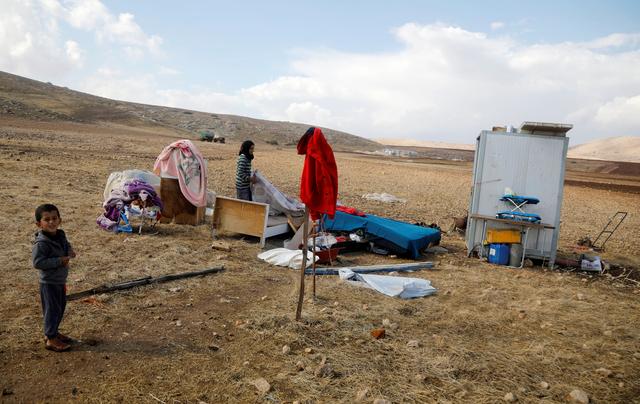Israel’s demolition derby must be stopped
https://arab.news/ye6jy

For the Israeli right, the last 20 years has been an extraordinary boom time. Ever since the fall of Ehud Barak in 2001, the far right has hogged the reins of power. Barring occasional slow-downs owing to American political remonstrations, the Israeli settlers — now numbering nearly 700,000 — have prospered in terms of power, number and land. From being on the peripheries of the Israeli leadership, settlers now occupy the heart of the political, military and even judicial fields.
Yet the Donald Trump years may prove to be the apogee of this period. Under Trump, the US abandoned the international legal and political consensus that the West Bank was occupied and that settlements were illegal. Far from dampening the settlement drive, which was the best Palestinians had hoped for in the George W. Bush and Barack Obama eras, Trump and his minions actively promoted it. Most recently, in November, Mike Pompeo became the first US secretary of state to visit a settlement. Also in 2020, the Israeli authorities gave the go-ahead for more than 12,000 West Bank settler homes, the largest number for eight years. Massive road-building projects promise to link them all up even more strategically, in plans Yehuda Shaul, the cofounder of Breaking the Silence, describes as “de facto annexation on steroids.”
The settlements are often built overlooking the rubble of Palestinian homes. Settlements are no coexistence project. Settler leaders actively pursue the removal and demolition of Palestinian communities that lie in their way. The Israeli government this month even earmarked $6.2 million to fund settler efforts to monitor Palestinian construction activity it considers illegal, including through the use of drones, which many settlers already use.
Across the West Bank and East Jerusalem, the most ambitious settlement projects necessitate the removal of Palestinian communities. Alongside the settlement-building bonanza, what we are seeing is Israel’s demolition derby. Plans to demolish communities and their infrastructure are accelerating, often only delayed by the courts. However, the operative word is delayed, not prevented.
In 2020 alone, the UN recorded 174 demolitions in East Jerusalem and 674 in the rest of the West Bank. So, even during the storm of the coronavirus pandemic, the Israeli authorities made about 1,000 Palestinians homeless. At the very moment Palestinians needed to stay at home to protect themselves and their communities, the bulldozers were dispatched. More than 11,000 Palestinians have now lost their homes in this fashion since 2009.
If you want the most cynical example of the practices of the Israeli occupation — and sadly there are many to choose from — you need look no further than what happened on Nov. 3, when the world’s eyes were transfixed on US exit polls and election needles. Then, Israeli forces demolished the entire Palestinian community at Khirbet Humsah in the Jordan Valley. In one go, a phalanx of bulldozers made 74 people, including 41 children, homeless. Everything possible was smashed, including kitchens, toilets and solar panels, as well as livestock pens and feeding troughs. The aim was not only to prevent the residents living there, but also to crush their ability to farm and herd there too. Where were they supposed to go, particularly in a cold and wet November? This did not concern the Israeli military.
I can imagine the scene, as sadly I have witnessed the immediate wake of such demolitions too often. Splattered around the carcasses of people’s homes are the leftovers of their existence, from kitchen utensils to children’s toys. One human rights worker claimed it looked like a tsunami had hit.
Israel has plenty of demolitions to press forward with, not least to realize its vision, which is remarkably similar to the one the Trump administration published last January. Back in 2015, official figures showed that, in the West Bank not including East Jerusalem, 11,000 demolition orders affecting 13,000 structures were outstanding. Bear in mind that, according to Israeli sources, 98.6 percent of Palestinian planning applications in the West Bank were denied between 2016 and 2018. Palestinians have long ago calculated that it was a waste of their scarce financial resources to even try.
Israel has established a coercive environment designed to push the Palestinian communities to leave. Forcible transfer is a war crime, so the preferred Israeli option is just to make life as unpleasant and unlivable as possible. This is why it frequently cuts water pipes to Palestinian communities.
At the very moment Palestinians needed to stay at home to protect themselves and their communities, the bulldozers were dispatched.
Chris Doyle
The diplomatic community in Jerusalem and Ramallah certainly noticed what happened at Khirbet Humsah. Once again, diplomats — all properly face-masked of course — trekked out to another devastated community to demonstrate their solidarity and opposition to this crime.
Palestinians could be forgiven for being more than a tad frustrated with this scene. Local diplomats largely make all the right noises and are often genuinely sympathetic. However, in European capitals the best expectation is another press release, which might as well be a photocopy of the last one. No Israeli ambassador was summoned to answer for this crime; no measures to thwart Israeli actions were adopted.
What Palestinians are left with is the vague hope that European leaders will demand compensation for the donor-funded structures Israel demolishes. European taxpayers’ money has effectively been torn up and thrown in the bin. The EU has demanded compensation from Israel numerous times. Between 2014 and the end of 2019, Israel destroyed about 474 structures funded with EU aid to the tune of €1.45 million ($1.76 million). Although some EU states are keener than others to make a stand, the net result is a further exhibition of European weakness and disunity.
The chances for peace are being bulldozed and buried in concrete. Maybe the current climate is not conducive to serious, productive negotiations, but the least the international community has to do is keep that prospect open and not allow the rules-based system to be knocked down.
- Chris Doyle is director of the London-based Council for Arab-British Understanding. Twitter: @Doylech










































